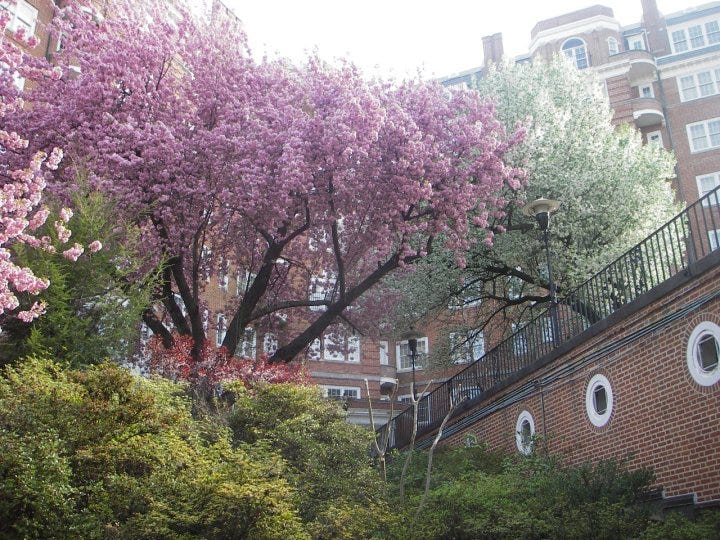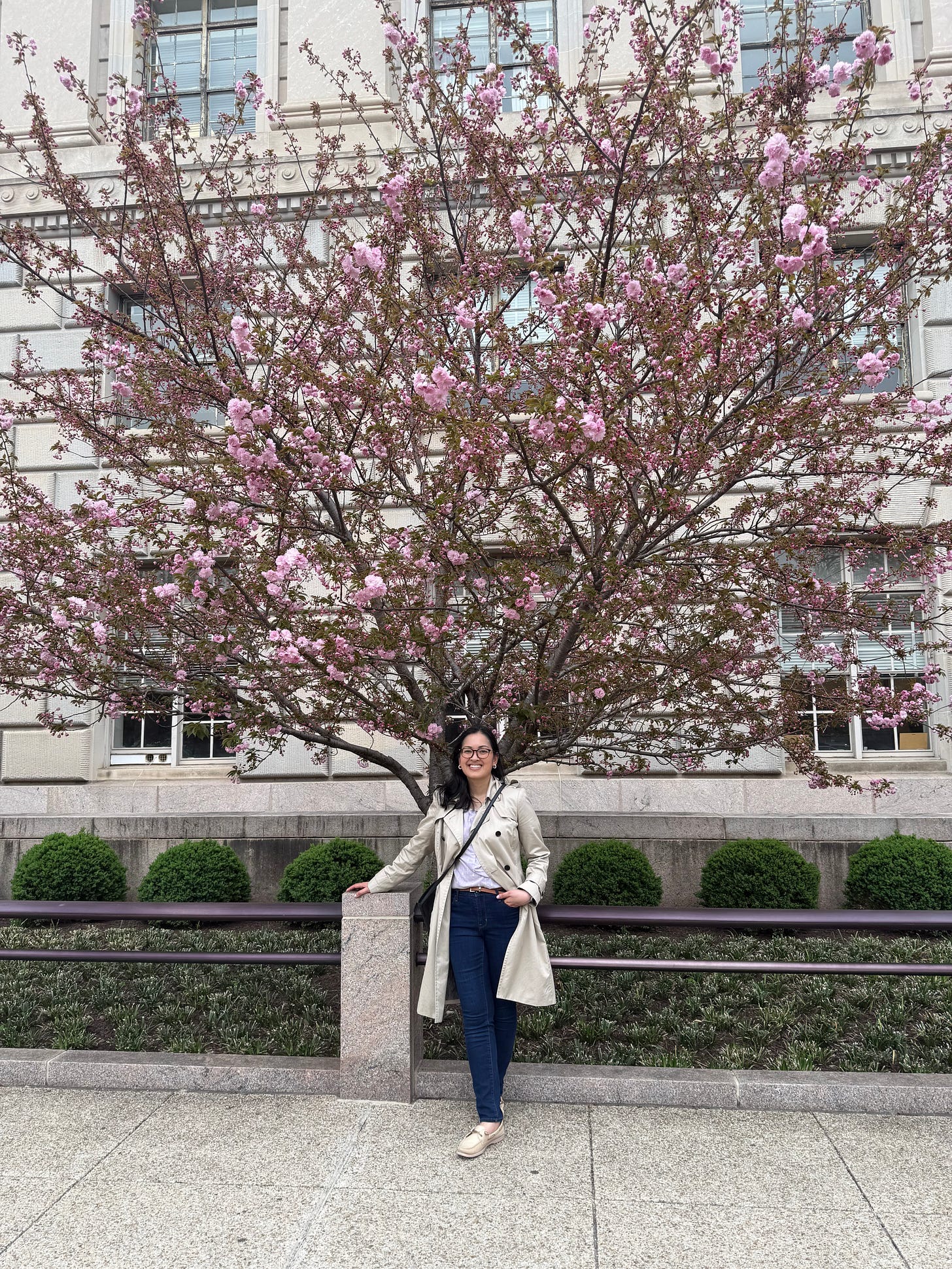Fifteen years ago, I went to Washington, D.C. for the first time to attend a scientific research conference. Our lab traveled as a party of four: our gangly, determinedly wholesome principal investigator; two graduate students, one of them officious and disdainful and the other perplexed and sweet; and me, the reluctant lab technician who tagged along to present our research but who — I suspect — everyone fully knew wouldn’t last long in this line of work.
One of the strangest things about getting older is how almost two decades can feel like the blink of an eye, and yet when I read through the towering stack of daily diaries that record all the events of my life, both mundane and cataclysmic alike, I realize just how long those fifteen years have been.
Things I still remember: the turbulent plane ride. Napping off my nausea on the first floor of a creaky old guest house, curtains drawn against the relentless Southern heat and air conditioner blasting because I was a delicate New England snowdrop. In the lobby, a pitcher that never ran out of lemonade and a plate that never ran out of chocolate chip cookies. On the walls, old portraits whose disapproving eyes followed me as though they knew I didn’t belong here. Not in this group, not in this career.
On the avenue outside, the cherry blossoms were out in full force, reminding me of the opening chapters of “Anne of Green Gables,” where Matthew Cuthbert is driving Anne home in a buggy through a cathedral of flowering trees that she dubs the White Way of Delight. I couldn’t stop sneezing even as I reveled in their beauty.
Other things I remember: a bowl of tomato soup in a deserted cafe, off-hours. Tulips like sentinels at a black iron gate. The freezing Marriott ballroom that served as the conference exhibition floor. Posters that summarized years, decades, lifetimes of research conducted upon the most minute pathway in the most minute region of the most minute insect. Wondering how all of this could inspire such passion and dedication in other people when all it did was make me sad for the life I’d abandoned. Lingering in the hotel gift shop to buy cherry blossom stationery because I wanted to walk back alone and enjoy D.C.’s stately elegance without having to feign interest in my colleagues’ chatter. The conference schedule I marked with blue pen to identify the hours in which I’d be able to escape, unnoticed, to the zoo or the Smithsonian.
Most of all, I remember how empty I felt. My close friend worked in an adjacent lab on the same floor and when I came home, I told him over lunch, near tears, that I felt like I was in some hopeless limbo. “It’s going to be okay,” he said. “You’ll figure it out. But first, you need to quit.”
Quit? I wasn’t a quitter. I had never quit anything in my life. Hadn’t I stayed in my Girl Scout troop in fourth grade even though our leader, one of my classmates’ moms, made racist digs at me whenever other parents weren’t around? Hadn’t I remained on my high school cross-country team even when my best friend dropped out and every race filled my unathletic soul with dread?
But the more I chewed on his advice, the more I agreed with it.
Why does quitting have to have such a bad connotation, anyway? Isn’t it wise to step away from something that doesn’t serve us and brings us no joy, if we’re able to? Wouldn’t it be logical to leave one career path I didn’t want in order to pursue another? Instead of saying, “I’m a failure,” couldn’t I say, “I gave this my best shot, and now I want to try something else”?
All the while I worked in that lab — entering data into spreadsheets, plating cells, loading 96-well plates, and dissecting insect brains — I was also writing fan fiction and loving every minute of it. I was gaining a significant readership. I was proving to myself that my talents lay elsewhere, and that as passionate as these scientists were about their research, so, too, could I be about something that held worth for me.
But I was going to have to quit first in order to find it.
There’s a major spoiler to this story, if you are familiar with me and my work. You know how it all turned out when I mustered the courage to quit that job, move to Boston, and ultimately discover that what I’d always loved as a child was what I would grow up to do. You know my character arc. The inciting incident of that stint in neuroscience and my torturous college years led me right back to where I’d started. Sometimes, kids aren’t too young to know what they want.
This month, I went to D.C. for the second time. The weather was much cooler and the cherry blossoms were only just beginning to emerge, but let me tell you — what a world of difference those fifteen years have made in my life. This time, I got to savor and explore without the weight of the future sitting on my shoulders. I walked the avenues hand-in-hand with the man I love, visiting monuments and museums and pondering the plight of this country to which we both have somehow miraculously come on the wayward paths of immigration and the hope of a better life.
And though my parents may not fully understand or agree, this dream I’m living is exactly why they came. No one can choose the timing of their life, but there’s a certain magic to showing up in the right place at the right time to see something bloom, whether that’s cherry blossoms, a split-second occurrence that alters your fate, or a smile on a stranger who will one day know you better than you know yourself.
My young Asian readers have a special place in my heart. Many of them are writers, too, and though their parents are now almost always younger than I am, I see how many of them adhere to the old ways. I see kids who are pushed into STEM no matter their natural abilities. I see life paths being laid out, each and every step prioritizing parental bragging rights over a child’s happiness. I see kids who believe that making a mistake is the same thing as failing, rather than as an example of being human, being flawed, and how our miraculous brains can and will adjust neural pathways to learn from the error. When I mentioned something along these lines in my latest therapy session, it was met with a wry smile and a gentle, “Julie, you didn’t use to allow yourself to be human, either.” Touché.
What I see as a cycle to be destroyed, others may see as respect, tradition, and practicality — they want to teach their kids that money is the key to stability and status and nothing is more important. There is a lot of fear and trauma baked into this style of parenting, and I have compassion for it.
But above all, I have compassion for these kids. I want them to know that it’s okay to quit. It’s okay to mess up. It’s okay to realize that something isn’t meant for you. And it’s okay to go back and begin again.
Because sometimes you can return to a place you’ve been, overwhelmed by nostalgia and the memory of being so lost, so adrift, and know that it was all a crucial piece of who you are now: someone who has bloomed into the truest and best version of themselves. And you would never have found it if not for the courage to quit.
XO
Julie









I love this, Julie, and I’m so glad you got to experience DC through new eyes. I deeply relate to experiencing fear-based parenting , where anything short of perfection was viewed as unacceptable failure.